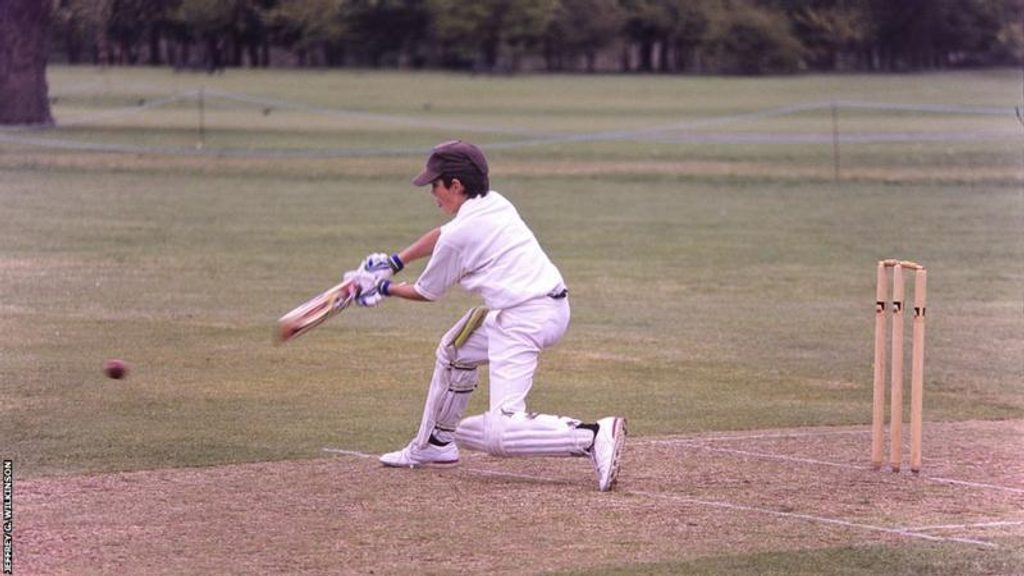
Nathan Leamon, England performance analyst and author of ‘The Test: A Novel’, reflects on the remarkable career of Alastair Cook.
This article first appeared on CricViz, the cricket intelligence specialists
It is May, 1999. Prince is on the radio telling us how to party, the Australians are the undisputed Lords of cricket, and every second news bulletin is explaining how the Y2K bug is going to end the world. I’m on a coach taking the Tonbridge School 1st XI to Bedford for our annual two-day match. Although we don’t yet know his name, word has reached us of a 14 year old left-hander who has been fast-tracked straight into their 1st XI.
We have a tall, quick opening bowler who has troubled most batsmen we’ve come up against. “Introduce yourself early”, I murmur to him as we watch the youngster walk out to warm up. He does, but the smaller boy isn’t fazed, looks comfortable in fact, and goes on to make a tidy forty. ‘Hmm, going to be a handful for the next few years’, I think.
Later, I hear about his first match of that season. Picked initially to play for the under 14 team, he is promoted at the last minute when the MCC arrive to play against the school and find themselves a man short. So his first match at the school is for the MCC against his own 1st XI. He scores a hundred. They don’t leave him out again.
[breakout id=”0″][/breakout]
Two years later, we travel back to Bedford, and in the fourth innings of a well-balanced game we set them 260 to win at a challenging rate. It will be the highest score of the match if they get it, and we fancy our chances. Will Smith, later of Durham, in his last year at the school and batting at three, is the main threat.
He doesn’t even get in.
The match finishes with 10 overs to spare, and then we watch their openers having their picture taken under a scoreboard that reads 261-0. Alastair Cook grins broadly in the evening sunlight.
Jump forward to his last year at school, and he is fast running out of batting records to break. Three hundred runs in a season is a fair return for a schoolboy batsman, a thousand runs is a brilliant, rare achievement. Cook scores over two thousand in his final year. And yet, whilst he is the most prolific batsman on the circuit, he doesn’t leap out at you as a future Test player. He cuts and pulls superbly, is good off his pads, and secure in defence. But he doesn’t have the coruscating firepower of a young Jason Roy, the silky range of shots of Gary Ballance or Sam Northeast, or the style and flair of James Taylor or Chris Jordan, all of whom I watch make hundreds as schoolboys. When they play they look like they are men amongst boys, like fully-formed professional batsmen who have outgrown the school matches they are playing in.
[breakout]There are very few players who have stepped so lightly and easily onto the next rung of the ladder[/breakout]
Cook on the other hand is distinguished largely by the sheer weight and tonnage of the runs he scores, not by the manner in which he makes them. To my eye, and there are better eyes around no doubt, he has utterly mastered the level of the game he is playing at, but doesn’t look set to dominate the levels above. After all, there are plenty of players who pull for fun in schoolboy cricket, but get found out once they come across proper bowling.
He couldn’t possibly prove me more wrong, nor prove me wrong faster. Not only does he make it, but he makes it look easy. There are very few players who have stepped so lightly and easily onto the next rung of the ladder, each and every single time the chance comes, from that first school match onwards.
On his first-class debut he makes 69 not out (batting as it happens with a certain Andy Flower). He makes a fifty in each of his first three games for Essex, finishing his debut season as an 18-year old averaging 47.8.
[caption id=”attachment_80382″ align=”alignnone” width=”800″] The young Cook made each progression look easy[/caption]
The young Cook made each progression look easy[/caption]
A year later, in his first match against Test opposition he makes 138 runs against the West Indies. Then he gets 63 on debut for the Lions, and of course, most famously, a bare three years after his last school match, he makes that fairytale hundred in his first Test, in India.
When a few years later I walk into the England dressing room for my first day on the job, he is there, with a smile and a handshake, as comfortable and relaxed in that rarefied atmosphere as it’s possible to be. It is impossible not to reflect on the transformation I’ve been witness to; from squeaky-voiced kid to Übermensch.
He goes on to do almost everything he could ever have dreamed of in the game. Year upon year he piles runs into mountains, and then shovels more on top for good measure. Just as he did at school, he buttresses the idiosyncrasies of his technique with a method trusted and true, and a tungsten-steel will to prevail. Most of all, he never, ever, gets bored of batting. Never, ever gets bored of making more runs.
[breakout]The strength, decency and generosity he shows in the bad times are a far better testimony to the quality of the man and the cricketer than his successes are[/breakout]
Too lucky for words, I am there for almost all the high points: there when his runs are the bedrock of a historic Ashes win in Australia, there when as captain he drags his team back from 1-0 down to take the series in India, there when he faces down a great South African team on their home turf, and there for his two quite different Ashes triumphs with two different teams.
And I am there for the low points as well. There are some bad ones. This is not the time to dwell on them, except to say the strength, decency and generosity he shows in those times are a far better testimony to the quality of the man and the cricketer than his successes are.
Losing a big series away from home is a hard road. Even those of us who are comfortably removed from the action can feel emotionally battered by the experience. For the players it is brutal, and for the captain, everything is magnified to extremes. He is left, exposed and alone, trying on the one hand to shield his players from the deluge of incoming fire, taking the bullets himself where necessary, whilst also within the dressing room, trying to lift spirits, calm nerves, re-energize his shaken and demoralised players, and inspire them to fight on. We ask an awful lot of our leaders in this sport.
[breakout id=”1″][/breakout]
Through all, he is excellent company, and impossible not to like. He is good-natured and playful, with a self-deprecating humour that is never far away. He is like that when it’s going well, and he is like that when it goes badly. Walk into the dressing room 10 minutes after he’s got out and it is impossible to tell from his demeanour whether he got a duck or a hundred. I mean, the man doesn’t even sweat.
Most of us get nowhere near the bucket list of challenges that Kipling sets us in If, but Cook ticks off more than most. Indeed, it is hard for me to read that poem and think of anyone I have known who better embodies those aspirations.
His records are, of course, remarkable and legion. Some will probably never be broken while the game exists in a recognisable form. They will lie there in the record books for future generations to wonder at – “159 consecutive Tests? No! That can’t be right” – and will be at least some partial testimony for the future fans of the game who never get to see him bat.
[caption id=”attachment_80030″ align=”alignnone” width=”800″] Cook captained England for a record 59 Tests including the 5-0 in Australia in 2013/14[/caption]
Cook captained England for a record 59 Tests including the 5-0 in Australia in 2013/14[/caption]
In world record terms, he has the most consecutive Tests ever played, the most Test runs by an opening batsman, the most runs in Asia by a visiting batsman, sixth on the all-time Test runs list, the fastest batsman to every total between 7,000-12,000 Test runs.
Amongst English cricketers, he has the most international runs, the most Test runs, the most international hundreds, the most Test hundreds, the most Test caps, the most Test catches (as a fielder), the most matches as captain, the most Tests as captain. The list goes on, and is as long as you want it to be.
I will just tell one more story.
A few years back we reported to the team hotel ahead of a Test match. I bumped into him at breakfast and asked if he’d had a nice weekend. It turned out that as a favour to a friend he had turned out for a scratch team against his friend’s club side. So of course he fielded, insisted on batting at number 11, and generally did all he could to make sure everyone enjoyed their day. Then the ninth wicket fell, with his team needing 19 to win from 5 balls.
[breakout id=”2″][/breakout]
“What did you do, I asked?” genuinely intrigued.
“Well, I made sure it was a tie, didn’t I” he told me, as if that were in equal parts, obvious and easy.
England have been luckier than we could ever know to have had him for so long. He will be deeply missed in every possible way.







